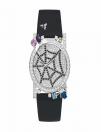-
奢侈品在中国 未来走向何方——中国本土奢侈品品牌正面临挑战
- 发布: 2011-3-19 13:02 来源:
第一消费
文字: 大 |
中 |
小
提要:中国奢侈品品牌试图提升自身销售份额 中国本土奢侈品品牌正面临严峻的挑战,这些挑战来自于例如像 LVMH或爱马仕这样的声名显赫,有着百年多的历史全球知名品牌。比起 全球知名品牌,他们有着更艰难的道路要走。

The Luxury Brand Market in China
China’s love of contemporary culture and expensive brand labels has seen a nation of Chinese tourists heading overseas toward London, New York and Paris for global fashion hotspots. Luxury brands such as Chanel, Rolex and Lacoste have captured the hearts of China’s post-80s generation who see western culture as a beautiful and glamorous lifestyle. At present, China is the second largest consumer of luxury goods consuming 27.5% of luxury products in the world.
Luxury brands have come to value China for its supply of youthful high-end consumers, where currently 75% of luxury purchases are from people under the age of 40. This is in stark contrast to the dominant senior adult consumer demographic in developed countries. 中国海外游客对于当今时尚生活方式的追捧以及对奢侈品的狂热度已直追伦敦、纽约和巴黎。例如像Chanel、Rolex和 Lacoste这样的奢侈品牌已成功捕获了喜爱及追逐绚丽多姿的西方生活方式的中国80后。现在,中国以每年达全球奢侈品消费 27,5%的比例占据世界第二。
奢侈品牌纷纷开始重视其年轻一代的高端消费者,在中国目前的奢侈品购买者中,75%的年龄是在40岁以下。这和发达国家中 年纪偏大的消费者群体形成了鲜明对比。
THE FIRST CHOICE 021 Luxury brand makers scent more profits International luxury brands often develop a new market through cooperation with local business partners who are more familiar with the scene in order to make good headway. But these brands are buying back direct control of their operations from China's local business partners, implying that international luxury brands don't want to share their high profit with others since the luxury market in China is developing at a staggering rate。

Luxury brands wrest back China market To keep their China expansion alive, many of the global players are expected to move into China's second- and third-tier cities in the coming years to tap demand there. Rapid development of high-end shopping malls and retail spaces across the country should help the domestic expansion of luxury groups, especially as mall operators could offer attractive terms to land big-name brands.
Chinese luxury wannabes try to raise their profile Chinese luxury brands may face their toughest battle on the homefront, where shoppers often prefer big international names such as France's LVMH or Hermes that carry more prestige and more than a century of history. They could face an even rougher road ahead as global brands, well aware of China's rapidly growing wealth, launch major expansion campaigns in the country that include opening stores in second and third-tier cities.
奢侈品攫取最大化利润 国际奢侈品牌往往通过和熟悉本国文化和商业环境的本土商业合作伙 伴的共同开发新的市场。但是这些品牌会通过这些本土公司来直接控制经 营,因为中国的奢侈品市场正以惊人的速度发展,谁都不想和别人再去分 享这种高额利润。
奢侈品抢占中国市场 为了保持自身的不断扩张,很多奢侈品品牌都期望在接下来的时间里 转移到中国二三线城市去满足他们的利润增长目标。 现在大型高档的购 物商城和零售场所的急剧增加,这些有助于国内奢侈品集团的扩张,尤其 是着名品牌会更吸引消费者的兴趣。
中国奢侈品品牌试图提升自身销售份额 中国本土奢侈品品牌正面临严峻的挑战,这些挑战来自于例如像 LVMH或爱马仕这样的声名显赫,有着百年多的历史全球知名品牌。比起 全球知名品牌,他们有着更艰难的道路要走。
TAG: 爱马仕 奢侈品 奢侈品品牌 中国 本土
-
- 奢华
- 珠宝
- 美容
- 服饰
- 女人
-
- 奥迪电动自行车Worthersee:高端运动.
- 香港选购名表的全新体验——2012 D.
- 牙买加风来袭 G-SHOCK热情活力抢眼
- G-SHOCK NOISE x编号223:我的拍摄.
- “生如夏花——黄梦洁作品展”在福.
- 探密超薄机芯制表工艺的极限
- 三叉星徽耀动北京车展——梅赛德斯.
- 唯雅诺皓驰版重装上市,顶级MPV续写.
- 福建奔驰引领高端商务车进入“奔驰.
- 热波来乐 联想的娱乐营销新时代
- 自然之美:以原石为基础的珠宝设计
- 全城热恋钻石狂欢节:买一颗送3颗
- 岁末寻宝新去处 翡翠原石50元秒杀
- “日落之钻” 界上最大的梨形鲜彩黄钻
- 『百年好合——胡焱荣翡翠艺术展』.
- DERAIN高品级美钻 闪耀幸福人生
- 乔易•塞纳多首饰演绎女性至真.
- 瑞恩钻饰牵手百合网,让钻石的光芒.
- 佐卡伊七夕珠宝大爱中国元素新品中.
- 瑞恩钻饰会员突破两百万 重礼寻“曾.
- 秀发裸妆“神物”低调显身 九面夏娃.
- 静佳JPlus玫瑰花酿花瓣面膜 肌肤爱.
- 母亲节,我拿什么奉献给你——我的.
- 完美底妆三部曲
- 芸萃精油:云南献给天下女人的礼物
- 伊利己悦宣言:做自己的人间四月天
- 美容达人晒“神秘驻颜术”,瞬间年.
- 欢迎光临VINISTYLE直营旗舰店
- “大娘”变“少妇” 诺曼姿原液逆转.
- 伊利己悦“粉”时刻,让美丽此刻出发















